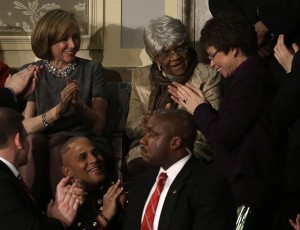
Desiline Victor, 102, of Miami is applauded by White House senior adviser Valerie Jarrett, right, and others, during President Barack Obama’s State of the Union address during a joint session of Congress on Capitol Hill in Washington, Tuesday Feb. 12, 2013. (AP Photo/Jacquelyn Martin)
President Obama promised in his victory speech to “fix” the long lines and other voting-related problems that Americans had to deal with across the country on election day. In his State of the Union address, he announced a plan to begin work on our broken election system.
“We must all do our part to make sure our God-given rights are protected here at home. That includes our most fundamental right as citizens: the right to vote. When any Americans – no matter where they live or what their party – are denied that right simply because they can’t wait for five, six, seven hours just to cast their ballot, we are betraying our ideals. That’s why, tonight, I’m announcing a non-partisan commission to improve the voting experience in America. And I’m asking two long-time experts in the field, who’ve recently served as the top attorneys for my campaign and for Governor Romney’s campaign, to lead it. We can fix this, and we will. The American people demand it. And so does our democracy.”
The announcement was underwhelming to some voting rights advocates. Some worried that it sounded similar to the Election Assistance Commission, which was formed after the 2000 election to prevent future contested election results. Republicans have attacked the EAC as a waste of money since it’s formation, and in recent years have attempted to shut it down by refusing to appoint or approve any nominees to empty posts. Last September, the Washington Post dubbed it the “zombie voting commission” due to its lack of leadership; all four commissioner spots are empty and its been without an executive director for over a year.
Ari Berman writes in The Nation that Obama’s plan is “less than inspiring” and that Ben Ginsberg, Romney’s former lawyer, is a “puzzling choice” to co-chair the commission.
For over two decades, Ginsberg has been a top lawyer for the Republican Party—the same party, you may recall, that has led the effort to restrict voting rights of late. Ginsberg helped lead the 2000 recount effort for George W. Bush. He was forced to resign from the Bush campaign in 2004 after it was revealed that he was also advising the vile Swift Boat Veterans for Truth. In 2006, Ginsberg said, “Just like really with the Voting Rights Act, Republicans have some fundamental philosophical difficulties with the whole notion of Equal Protection.”
Berman takes comfort in the expectation that, much like the EAC, the commission will go nowhere.
Election expert and legal blogger Rick Hasen has a more hopeful view of Ginsberg. Because he is a “strong conservative,” he writes that his involvement might make it “more likely that other Republican leaders in this area will join in the work of the commission, and that what emerges really does get some bipartisan support.” But he wonders why the goals of the commission — which he says basically amount to a list of best practices — are so modest.
The League of Women Voters agreed with Hasen and dismissed the president’s plan in a statement, saying that it is “not a bold step; it is business as usual.” Charles Pierce wrote in Esquire that a bipartisan commission is “the Washington policy equivalent of a sock drawer.” But the Brennan Center for Justice’s Michael Waldman, who talked with Bill last summer about voter suppression and voting rights, released a statement last night calling it “an important step” while urging Congress to go farther and enact national standards to modernize our voting system.
One piece of legislation supported by the Brennan Center would create a nationalized voter registration system that Common Dreams‘ Brendan Fischer points out would also “reduce opportunities for the in-person “fraud” that Republicans espouse.” Other legislative proposals would make early voting mandatory, create standards for polling places and prevent wait times of more than one hour.

